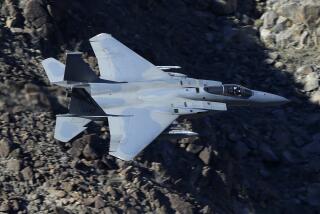Cheney Aides Warned Dugan on Media : Military: Worried about his loose tongue, they had urged him not to take journalists on Saudi tour.
- Share via
WASHINGTON — Gen. Michael J. Dugan had no doubts about the wisdom of his decision when he invited three reporters to accompany him on a four-day tour of U.S. air forces in Saudi Arabia last week.
Dugan, a tall, gregarious, self-assured fighter pilot, believed that the Air Force has a critical--indeed central--role in any military operations against Iraq, and he wanted to tell his service’s story.
Press aides to Defense Secretary Dick Cheney warned him not to take journalists, concerned that Dugan had been loose-lipped in the past. They also were worried that he would overshadow a visit to Saudi Arabia planned by Gen. Colin L. Powell, chairman of the Joint Chiefs of Staff, for the same week.
Along with Dugan on the trip were five other Air Force generals--the senior officers in charge of operations, logistics, technology, the Air National Guard and Reserve. All were expansive in their comments to the three reporters, who agreed early in the trip that they would reserve publication of their stories until the group returned to Washington last Friday night.
On the 14-hour trip to Saudi Arabia, Dugan spoke in general terms about Iraqi military capabilities and the uses and limits of American air power. He wore an Air Force blue jump suit with “Mike Dugan” embroidered in script above his right breast and four stars upon each collar wing.
He spent several hours at the controls of the plane, a windowless VIP version of the Boeing 707, and landed it flawlessly at a U.S. air base outside of Madrid for refueling.
All agreed that everything said aboard the aircraft would be on the record.
On the trip over, Dugan said that the Iraqi air force “has very limited military capability” and called the 1-million-man Iraqi army “incompetent.” Cheney cited underestimation of a potential enemy as one of the reasons for which Dugan was fired.
Dugan also discussed the utility of bombing key industrial and civilian targets. Although he never speculated about bombing population centers, he did say that if Iraqi President Saddam Hussein is perceived as unable to protect the Iraqi people from “these intruding foreigners,” the people might overthrow him.
Once in Saudi Arabia, Dugan and his party broke off from the journalists, who represented The Times, the Washington Post and the weekly trade magazine Aviation Week and Space Technology.
Dugan and the generals visited several U.S. air bases in Saudi Arabia and the Persian Gulf states of Oman and the United Arab Emirates.
On Friday, he returned to the big U.S. military staging area at Dhahran, gave a half-hour news conference to a pool of U.S. reporters working out of Saudi Arabia and boarded his plane for the 16-hour journey back to Washington.
Dugan was clearly exhilarated by what he had seen--the morale of the air crews, the elaborate Saudi ground facilities, the war-ready condition of the hundreds of front-line combat aircraft, the innovation shown by Air Force personnel in a very difficult environment.
He was asked to expand upon his philosophy of air power and discuss what U.S. war plans might include. It was during the first leg of the return trip, between Dhahran and Torrejon Air Base, Spain, that Dugan made his now-infamous comments about seeking “centers of gravity” in Iraq where air power could have a decisive effect early in a conflict.
He said he believes air power is “the only answer available to our country in this circumstance” and then proceeded to discuss possible targets of air strikes in Iraq, including Hussein, his family, his inner circle and his mistress.
He noted that U.S. military doctrine has long called for a campaign of “decapitation” of enemy military organizations by targeting their command and control centers and trying to kill their senior field generals.
“Saddam is a one-man show in Iraq,” Dugan said. “If and when we choose violence, he ought to be at the focus of our efforts.”
It was chiefly those remarks that led to Dugan’s early retirement.
An Air Force official said Monday that Dugan did not question the accuracy of the quotations used in The Times and the Post and does not regret having invited reporters to accompany him.
But the corridors of the Pentagon were ringing with Cheney’s harsh words when firing Dugan, and it is unlikely that senior military officers will display anything approaching Dugan’s openness in the foreseeable future.
More to Read
Get the L.A. Times Politics newsletter
Deeply reported insights into legislation, politics and policy from Sacramento, Washington and beyond. In your inbox twice per week.
You may occasionally receive promotional content from the Los Angeles Times.









